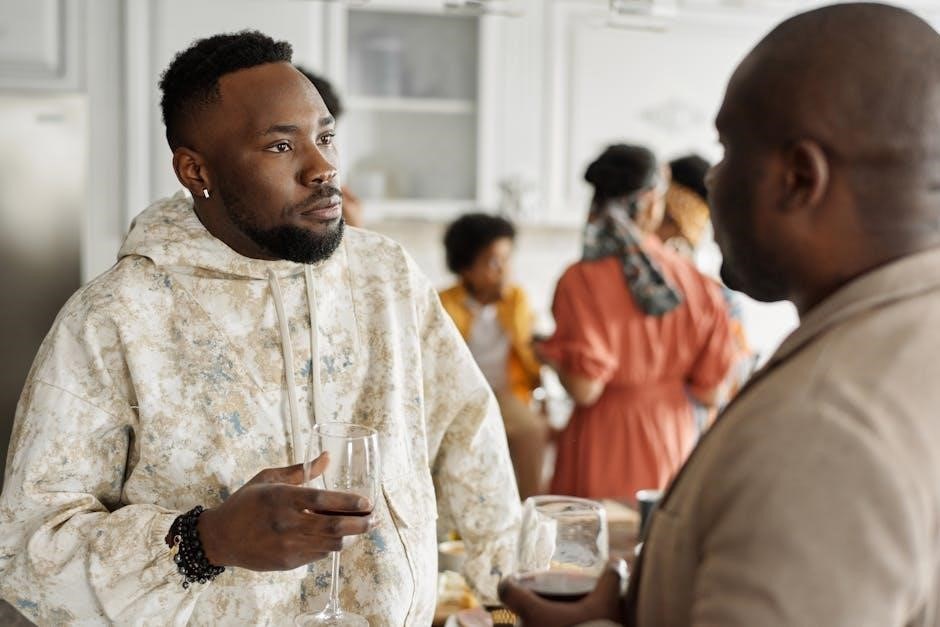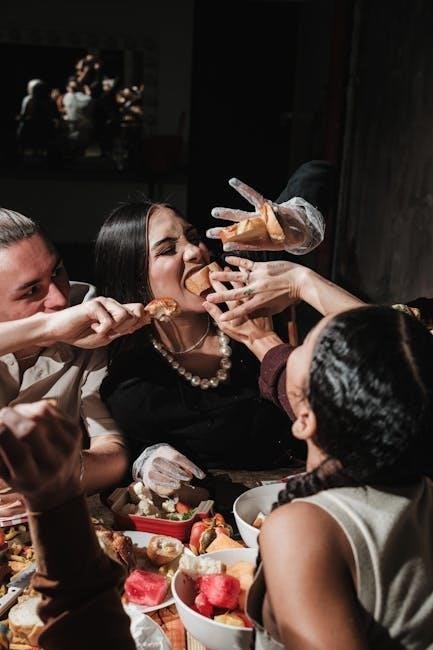Dinner with Friends, a Pulitzer Prize-winning play by Donald Margulies, explores the intricate lives of two couples, Gabe and Karen, and Tom and Beth, delving into themes of marriage, friendship, and divorce. With humor, warmth, and profound insight, it examines the challenges of modern relationships, making it a timeless commentary on human connections. The play is widely available in PDF format for readers to explore its emotional depth and nuanced storytelling.
Overview of the Play
Dinner with Friends is a Pulitzer Prize-winning drama by Donald Margulies that follows two couples, Gabe and Karen, and Tom and Beth, as their close friendship is tested by infidelity and divorce. The play offers a poignant yet humorous exploration of marriage, loyalty, and the complexities of human relationships. Its emotional depth and relatable themes make it a compelling read, available in PDF format for easy access.
Donald Margulies is a renowned American playwright and Pulitzer Prize winner, best known for Dinner with Friends. His work often explores themes of relationships, identity, and societal challenges, blending humor with emotional depth. Margulies’ plays, including Time Stands Still, are celebrated for their nuanced character development and insightful commentary on modern life, making him a significant voice in contemporary theatre.
Publication and Availability in PDF Format
Dinner with Friends by Donald Margulies is widely available in PDF format, published by Theatre Communications Group. The play can be downloaded from platforms like Dramatists Play Service, offering convenience for readers and theatres alike. Its digital accessibility ensures that this Pulitzer Prize-winning drama remains a popular choice for both personal reading and theatrical productions, maintaining its relevance in modern literature.
Plot and Characters
Dinner with Friends follows two couples, Gabe and Karen, and Tom and Beth, as they navigate the complexities of marriage, friendship, and unexpected divorce, revealing emotional depth and transformation through their intertwined lives.
The Two Couples: Gabe and Karen, Tom and Beth
Gabe and Karen are a stable, loving couple, while Tom and Beth face marital turmoil. Their close friendship is tested when Tom leaves Beth, revealing cracks in their relationships. This interplay explores loyalty, betrayal, and the resilience of bonds, offering a poignant look at how external conflicts affect even the strongest ties between friends and partners.
Marriage, Friendship, and Divorce: Key Themes
The play delves into the complexities of marriage, friendship, and divorce, exploring how these themes intertwine. It portrays the emotional struggles of two couples as their relationships evolve, highlighting the challenges of maintaining friendships amidst marital dissolution. With poignant realism, the play examines the fragility and resilience of human connections, offering a nuanced exploration of love, loyalty, and loss.
Conflict and Transformation in Relationships
The play vividly portrays the conflicts and transformations that arise in relationships, particularly when one couple’s divorce reverberates through their friendships. It captures the tension and emotional shifts as characters confront their own vulnerabilities and question their bonds. Through these dynamics, the play reveals how change can both strain and redefine relationships, offering a compelling study of human interaction and growth.

Themes and Symbolism
Dinner with Friends delves into themes of marriage, friendship, and divorce, using humor and warmth to explore the complexities of human relationships. Symbolizing the fragility of modern marriage, the play offers profound insights into emotional struggles and societal expectations, blending comedy with poignant drama to create a relatable and engaging narrative.
The Destruction of Modern Marriage
Dinner with Friends masterfully portrays the dissolution of modern marriages through the unraveling of two couples’ relationships. The play highlights societal pressures, emotional disconnections, and the clash between personal aspirations and expectations. It reveals how these factors lead to the erosion of trust and intimacy, ultimately exposing the vulnerabilities and fragility of marital bonds in contemporary life.
Friendship and Its Challenges
Dinner with Friends delves into the complexities of friendship, showing how it endures yet falters under strain. The close bond between Gabe, Karen, Tom, and Beth is tested by betrayal, misunderstandings, and diverging paths. Margulies illustrates how friendships can offer support but also face challenges like jealousy, distance, and changing priorities, revealing the delicate balance required to sustain these essential relationships over time.
Humor, Warmth, and Insight in the Play
Dinner with Friends masterfully blends humor with heartfelt moments, offering a nuanced exploration of human emotions. Margulies uses witty dialogue and relatable situations to create a warm yet insightful narrative. The play’s ability to balance light-heartedness with profound reflections on marriage and friendship makes it both entertaining and thought-provoking, resonating deeply with audiences seeking emotional depth in storytelling.
Dramaturgy and Structure
Dinner with Friends blends comedy and drama seamlessly, featuring a flexible structure with acts and scenes that flow naturally, enhancing its emotional depth and thematic exploration.
Comedy/Drama Genre
Dinner with Friends masterfully combines comedy and drama, blending witty dialogue with poignant moments to create a relatable exploration of human relationships. The play’s genre reflects its ability to balance humor with deeper emotional truths, offering audiences both laughter and introspection. This blend of genres underscores its universal appeal and contributes to its acclaim as a modern theatrical masterpiece.
Flexible Set and Cast Requirements
The play features a minimalistic set design, focusing on intimate settings like dining rooms and kitchens, which enhances its emotional depth. With a small cast of four characters, it allows for dynamic interactions and accessibility for both professional and amateur productions. This flexibility makes Dinner with Friends a practical choice for theaters of varying resources, ensuring its wide performance potential and enduring popularity.
Act and Scene Analysis
Dinner with Friends is structured into three acts, each advancing the emotional narrative of the couples. Act 1 sets the tone with a dinner gathering, while Act 2 escalates tensions as secrets surface. Act 3 resolves with poignant realizations, highlighting the fragility of relationships. The scenes flow seamlessly, balancing humor and drama to create a compelling exploration of love, loss, and friendship. The Pulitzer Prize-winning structure ensures a deeply engaging theatrical experience.
Historical Context and Background
Dinner with Friends, by Donald Margulies, premiered at the 1998 Humana Festival, opened Off-Broadway in 1999, and received the 2000 Pulitzer Prize for Drama, acclaiming its exploration of human relationships.
Premiere at the Humana Festival of New American Plays
Dinner with Friends made its debut at the 1998 Humana Festival of New American Plays, a prestigious event showcasing innovative theater works. This premiere marked a significant milestone in the play’s journey, introducing its nuanced exploration of marriage and friendship to audiences and critics alike, setting the stage for its future success and acclaim.
Off-Broadway Opening and Reception
Dinner with Friends opened Off-Broadway in 1999, receiving widespread critical acclaim for its nuanced portrayal of marital dynamics and friendship. Audiences and critics praised its insightful dialogue and relatable characters, solidifying its reputation as a compelling exploration of modern relationships. The production further cemented the play’s growing recognition and set it on the path to broader success.
2000 Pulitzer Prize for Drama
Dinner with Friends earned the prestigious 2000 Pulitzer Prize for Drama, recognizing its profound examination of marital relationships and friendships. This accolade highlighted Margulies’ ability to weave humor and depth, creating a relatable and impactful narrative. The award further established the play’s significance in contemporary theatre, celebrating its honest portrayal of human struggles and connections.

Characters and Their Analysis
The play revolves around four complex characters: Gabe, Karen, Tom, and Beth. Their relationships and personal struggles are deeply explored, revealing their emotional depths and vulnerabilities.
Gabe: The Voice of Reason
Gabe serves as the moral anchor, offering a rational perspective amidst the chaos. His calm and introspective nature provides balance, making him the emotional stabilizer in the group. Gabe’s loyalty to Karen and his dedication to their marriage highlight his role as a steadfast partner and friend, embodying the voice of reason in the turbulent relationships.
Karen: The Emotional Core
Karen is the heart of the play, expressing deep emotions and vulnerability. Her relationship with Gabe and the unraveling of Beth and Tom’s marriage evoke strong reactions. Karen’s sensitivity and empathy make her the emotional center, as she grapples with the changes in her friendships and the stability of her own marriage, revealing her complex inner world.
Tom: The Catalyst for Change
Tom’s decision to leave Beth after twelve years of marriage sets off a chain reaction, disrupting the lives of both couples. His actions challenge the stability of Gabe and Karen’s relationship, forcing them to confront their own vulnerabilities. Tom’s choices act as a catalyst, driving the narrative and revealing the fragility of long-standing friendships and marriages.
Beth: The Struggling Partner
Beth, Tom’s wife, is portrayed as a complex character grappling with the dissolution of her marriage and the strain it places on her friendships. Her emotional journey is marked by vulnerability and resilience as she navigates the fallout of Tom’s departure and the impact it has on her relationships with Gabe and Karen, revealing her strength amidst personal turmoil.

Critical Reception and Impact

Critical Reception and Impact of Dinner with Friends was immense, earning the 2000 Pulitzer Prize. It resonated deeply with audiences, solidifying its lasting theatrical impact.
Reviews and Praise for the Play
Dinner with Friends received widespread acclaim for its nuanced portrayal of relationships. Critics praised its humor, emotional depth, and relatable characters. The play’s ability to balance comedy with heartfelt insight earned it the 2000 Pulitzer Prize, solidifying its reputation as a modern classic. Audiences and reviewers alike celebrated its honest exploration of marriage and friendship, making it a standout work in contemporary theater.
Commercial Success and Popularity
The Pulitzer Prize-winning Dinner with Friends achieved remarkable commercial success and popularity. Its nuanced exploration of relationships resonated widely, leading to successful productions and a strong following. Available in PDF format through Dramatists Play Service, the play remains accessible and widely read, contributing to its enduring popularity and critical acclaim in contemporary theater.
Cultural Significance of the Play
Dinner with Friends holds significant cultural value as it captures the essence of modern marital struggles and friendships. Its honest portrayal resonates deeply, making it a relatable and impactful work. The play’s exploration of universal themes has cemented its place in contemporary theater, offering audiences a mirror to their own experiences and fostering meaningful conversations about relationships and societal norms.
Accessing the Play in PDF
Dinner with Friends by Donald Margulies is readily available in PDF format through platforms like Dramatists Play Service and other online repositories, ensuring easy access for readers and theater enthusiasts worldwide to explore this poignant exploration of relationships and modern marriage.
Availability on Dramatists Play Service
Dramatists Play Service, a premier theatrical publishing agency, offers Dinner with Friends in PDF and other digital formats. Established in 1936, this platform provides affordable access to plays, ensuring wide availability for both readers and theatrical productions. Users can easily download or purchase the play, making it a convenient option for those interested in exploring Margulies’ work.
Download Options and Formats
Dinner with Friends by Donald Margulies is available in PDF and ePUB formats, ensuring accessibility for readers. The play can be downloaded for free from various online sources or purchased through Dramatists Play Service. Additionally, it is accessible on platforms like Scribd and other digital archives, making it easy to obtain and read.
Related Works by Donald Margulies
Besides Dinner with Friends, Donald Margulies has authored notable works like Time Stands Still and Brooklyn Boy. His plays often explore human relationships and emotional complexity, resonating with themes found in Dinner with Friends. These works are available in PDF and other formats, offering readers a deeper dive into his literary style and thematic preoccupations.
Dinner with Friends remains a poignant exploration of marriage and friendship, earning its place as a Pulitzer Prize-winning classic. Available in PDF, it continues to resonate deeply with audiences, offering timeless insights into human relationships and emotional complexity. Its legacy endures as a significant work in modern American theater, reflecting Donald Margulies’ masterful storytelling and profound understanding of human connections.
Final Thoughts on the Play’s Relevance
Dinner with Friends offers timeless insights into the complexities of human relationships, making it highly relevant today. Its exploration of marriage, friendship, and divorce resonates universally. The play’s emotional depth and relatable characters ensure its continued appeal, while its availability in PDF format allows new generations to engage with Margulies’ masterful storytelling and reflect on their own relationships and societal norms.
Legacy of “Dinner with Friends”
Dinner with Friends has left an indelible mark on contemporary theater. Its honest portrayal of relationships and its Pulitzer Prize win solidified its place as a modern classic. The play continues to inspire adaptations and discussions, while its availability in PDF ensures its accessibility for future audiences and scholars, cementing its enduring influence on dramatic literature and human storytelling.